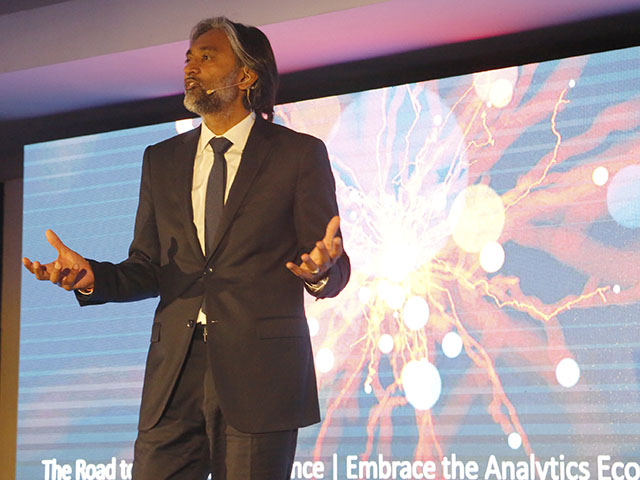SAS Africa Road to Artificial Intelligence Part 1: Data and AI - why you should care
By Ryan Noik 3 July 2018 | Categories: news
SAS Africa’s Road to Artificial Intelligence event, which took place in Rosebank last week, brought a number of welcome surprises.
First of these was a frank discussion and exploration of why data needs to be involved in their decision making process. Desan Naidoo, the VP of SAS Africa, began with a topical example, asking the audience how many of them predict who will win the soccer world cup based on their gut and their heart. Then, he asked, how many people make critical business decisions based on the same, rather than on data and analytics.
So why is depending on data more important? This, he explained, is because data and analytics are challenging well established business models. “Organisations today are disrupting their industries and being successful based on a blend of data, analytics and collaboration,” he stressed. For businesses in particular, the democratization of analytics, which entails bringing analytics to everyone in the organisation, will give rise to new opportunities.
Dr Jacques Ludik, the founder and CEO of Cortex Logic, added that the opportunity in using data is that it can unlock new value to the business, most particularly in regards to bolstering productivity and increasing revenues, reducing risks and lowering costs.

Desan Naidoo, VP, SAS Africa
AI is coming
But it is not just data and analytics on their own, or even, accompanied by collaboration. As essential as each are, the conversation quickly turned to the importance of using artificial intelligence (AI) as well.
Admittedly, getting a grip on AI can feel like trying to wrestle a wet fish. As soon as you think you have a firm grasp, it’s slipped through your fingers. And yet, doing so is apparently worth the effort, with IDC predicting that expenditure on AI by 2020 will exceed a whopping $50 billion dollars globally.
Furthermore, as was stressed throughout the day, the journey to using AI is just that, a journey, not a race, nor even an end goal. But what is AI exactly?
Misconceptions, busted
Larry Orimoloye, SAS Global senior business solutions manager, began by elaborating on what AI is not. He noted that it is not a crystal ball, which can predict everything perfectly, nor is it intelligent autonomous robots. Rather, it is better seen in machines which can perform deep learning (one example given was an AI which learned to read), conversational systems such as Siri or Alexa, chatbots - which are becoming increasingly popular with the likes of banks and insurance companies - and even face and image recognition.
He pointed out that AI is not new. It has actually evolved from the neural networks of the previous century, to machine learning in the past eight years, and now, becoming more about cognitive systems.

Dr Jacques Ludik, CEO, Cortex Logic
But is it real?
The big question is whether data, analytics and AI are all just hype, or do they have real world, beneficial application? Concrete examples were given to back up the latter. Indeed, in tandem, these megatrends can be used for a variety of value offering services, such as asset performance analytics, which would be able to predict when a transformer is going to fail, and act before it causes undue damage.
As well, AI can be used to predict the optimal time to take down a piece of machinery to do maintenance.In financial services, AI and data enable real time credit scoring, and power chatbots to ensure a better customer experience. And, in an arena particularly pertinent to Africa, it also offers the non-invasive monitoring of endangered species to better aid in conservation efforts.
Where to from here?
The next question is the use of data, analytics and AI leading us? According to Naidoo, this is heading towards the emergence of a “data driven, analytics economy,” one that is expected to infiltrate every aspect of our lives on a daily basis; from how we bank and where we shop, to even who we date. Indeed, it is quite possible that in the near future, the decision as to who to date will be done for us at our demand by an artificial intelligence, using the wealth of data available to predict the best possible matches and partners.
Clearly, data and its usage is set to change our lives. The question though, is whether we, and businesses, are ready for all the changes it will bring?
Most Read Articles

Have Your Say
What new tech or developments are you most anticipating this year?



